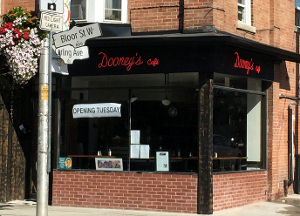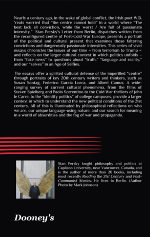 Apocalypses Now by Michael Boughn
Apocalypses Now by Michael Boughn The Apocalypse, a long standing event of ongoing fascination for humans, is going through some significant changes. A ubiquitous entertainment presence over the last few years, the Apocalypse has come a long way from the God-fueled hallucinatory prose of John of Patmos with its... [Read more...]
 Desperately Seeking Readers by Stan Persky
Desperately Seeking Readers by Stan Persky Alex Good, Revolutions: Essays on Contemporary Canadian Fiction (Biblioasis, 2017). Literary critic Alex Good’s acerbic collection of essays on contemporary Canadian fiction – which he doesn’t appear to like very much — nonetheless starts in the right place: namely,... [Read more...]
 Caitlin DeSilvey’s Proposition by Brian Fawcett
Caitlin DeSilvey’s Proposition by Brian Fawcett Caitlin DeSilvey, Curated Decay: Heritage Beyond Saving, The University of Minnesota Press, Minneapolis and London, 2017, pb, 220 pages, $27.00 (USD) You get the sense that it would be fascinating to spend a morning with Caitlin DeSilvey going through a neglected industrial building... [Read more...]
Newest Articles
Apocalypses NowIs it the End of the World as we know it? And, if so, Michael Boughn asks, what will it look like? Zombies, Aliens, AI? Updating the Apocalypse.
Letter from Europe: The Little Dutch BoyHe stuck his finger in the leaky dike. Did it stop the floodwaters of right-wing populism washing over Europe?
An Interesting WriterNews from New Denver. Meeting “Dead Crow.”
Narrating GallowayNovelist Steven Galloway got fired from his job as Creative Writing Dept. chair at UBC. What happened? It depends on the story you tell.
Trump’s Oink-Oink, er, Inaugural SpeechThe joys of free speech and writing columns-by-number.
Read all articlesNewest Reviews
Desperately Seeking ReadersReading is in big trouble, says critic Alex Good. CanLit, he adds, may be in even bigger trouble.
Caitlin DeSilvey’s PropositionAs a “cultural geographer” wanders through abandoned industrial buildings in “Curated Decay,” Brian Fawcett wonders whether “autoethnography” is just another fancy academic term for preferring self-therapy to dealing with the mess in Detroit and the rest of a dying planet.
Brawl on the Beach: The Making of an Absurdist MasterpieceHow Albert Camus’s literary classic came into being, despite an absurd world and an absent divinity.
Mein Trumpf, or Through a Cracked Crystal Ball DarklyReading the far-right subculture.
In Madrid: Landscape with GhostsIn Spain’s capital there are absent poets, the absence of government, and terrace cafes on a late summer afternoon
Read all reviewsNewest Dictionary Entry
Native-born Immigrants. Huh?In the wake of the one-man terrorist attack at Westminster, London — the parliamentary site of Britain’s government — on Wednesday, March 22, 2017, Dooney’s Dictionary is asking an oxymoronic question (emphasis on the moronic part): How does a native-born Brit get instantly transformed into an “immigrant”?

Westminster.
Of course, the real answer is: he doesn’t. A native-born Brit, especially one that stays in the United Kingdom, does not become a British immigrant, or an immigrant of anywhere else unless he migrates to somewhere else, say, Pango-Pango, or Pakistan, or Mexico or… wherever.
That is, a native-born Brit doesn’t become an immigrant or an almost-immigrant or a sort-of-immigrant until his identity falls into the hands of right-wing European politicians in Britain, France, or Poland.
Yes, Poland. When British-born, 52-year-old Khalid Masood (born in Kent, England, by the way) committed an act of terror by driving a rented car into pedestrians on Westminster Bridge, killing three people, then crashing the car into the wall surrounding Parliament, and finally rushing into the guardhouse entrance and stabbing to death a policeman before being gunned to death by other on-duty police officers, the conservative Polish Prime Minister, Beata Szydlo, of the Peace and Justice Party (PiS), simply had to weigh in.

Polish PM Beata Szydlo.
Although Szydlo knew little of what happened, and even before the terrorist was named or otherwise identified, she quickly drew a link between the attack and the European Union’s migrant policy, saying it vindicated Warsaw’s refusal to take in war refugees under the EU’s quota scheme, which tries to equitably re-settle people fleeing war-torn countries like Syria.
“I hear in Europe very often,” she said, “do not connect the migration policy with terrorism, but it is impossible not to connect them.” Her false assumption was that if there was an act of terrorism, it must have been committed by an immigrant. She unhelpfully added that the EU migration commissioner had visited Warsaw “to tell us, you have to take these migrants… and two days later another terrorist attack in London occurs.” Whoops, logical missing link here. (John Henley and Amber Jamieson, “Anti-immigration politicians link London attack to migrant policy,” The Guardian, March 23, 2017.)
Szydlo wasn’t the only politician promoting idiocy. Even after it was learned that the attacker was British-born, France’s National Front leader, Marine Le Pen “joined anti-immigration politicians in linking the London attack to migrant policy, despite the attacker being British.” The attacker, Masood, was born Adrian Ajao, of mixed parentage, and was later known as Adrian Elms among a half-dozen other aliases and real names during a murky career that included violent crimes, jail time, religious conversion, marriages and fatherhood. Undaunted, Le Pen insisted, “We must control our borders,” even though the attacker hadn’t crossed any borders to commit his crime.
The more extreme and bonky interpretations came, perhaps unsurprisingly, from former United Kingdom Independence Party (Ukip) leader Nigel Farage and other supporters from the Leave.EU organisation. Farage appeared on U.S. television the day after the murderous incident to argue “that the London attacks proved Donald Trump’s hardline immigration and anti-Muslim policies were correct.” Said Farage, “Surely this is the big takeout: when Donald Trump tries to make America safer… we have people… in Westminster out on the streets protesting.”
Leave.EU accused mainstream politicians of “facilitating acts of terror almost identical to this throughout Western Europe.” British PM Elizabeth May, said the Leave campaign group, had “failed to implement the British people’s desire to have secure borders and… has overseen unprecedented levels of immigration.”
When someone finally said to Leave.EU, “Hey guys, the terrorist wasn’t an immigrant, he was Brit-born,” the border-obsessed were unimpressed. They replied (in a tweet, of course), “British-born means nothing if he lived in a segregated community and hated the British way of life… Not British at all.” Huh?
Read all dictionary entries







